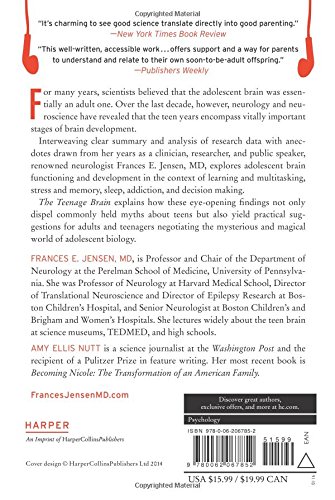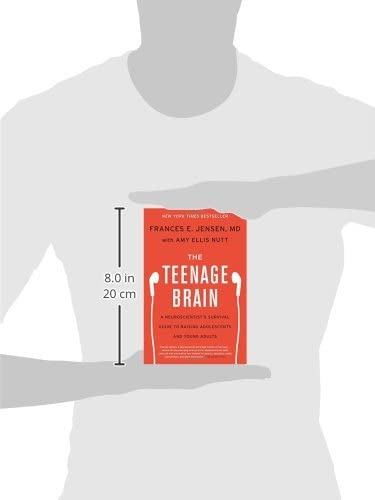A New York Times Bestseller Renowned neurologist Dr. Frances E. Jensen offers a revolutionary look at the brains of teenagers, dispelling myths and offering practical advice for teens, parents and teachers. Dr. Frances E. Jensen is chair of the department of neurology in the Perelman School of Medicine at the University of Pennsylvania. As a mother, teacher, researcher, clinician, and frequent lecturer to parents and teens, she is in a unique position to explain to readers the workings of the teen brain. In The Teenage Brain, Dr. Jensen brings to readers the astonishing findings that previously remained buried in academic journals. The root myth scientists believed for years was that the adolescent brain was essentially an adult one, only with fewer miles on it. Over the last decade, however, the scientific community has learned that the teen years encompass vitally important stages of brain development. Samples of some of the most recent findings include: Teens are better learners than adults because their brain cells more readily “build” memories. But this heightened adaptability can be hijacked by addiction, and the adolescent brain can become addicted more strongly and for a longer duration than the adult brain. Studies show that girls’ brains are a full two years more mature than boys’ brains in the mid-teens, possibly explaining differences seen in the classroom and in social behavior. Adolescents may not be as resilient to the effects of drugs as we thought. Recent experimental and human studies show that the occasional use of marijuana, for instance, can cause lingering memory problems even days after smoking, and that long-term use of pot impacts later adulthood IQ. Multi-tasking causes divided attention and has been shown to reduce learning ability in the teenage brain. Multi-tasking also has some addictive qualities, which may result in habitual short attention in teenagers. Emotionally stressful situations may impact the adolescent more than it would affect the adult: stress can have permanent effects on mental health and can to lead to higher risk of developing neuropsychiatric disorders such as depression. Dr. Jensen gathers what we’ve discovered about adolescent brain function, wiring, and capacity and explains the science in the contexts of everyday learning and multitasking, stress and memory, sleep, addiction, and decision-making. In this groundbreaking yet accessible book, these findings also yield practical suggestions that will help adults and teenagers negotiate the mysterious world of adolescent development.
The Teenage Brain: A Neuroscientist’s Survival Guide to Raising Adolescents and Young Adults
$9.75
This book educates students on neuroscience and adolescent psychology, explaining brain development during the teenage years.
Additional information
| Weight | 1.05 lbs |
|---|---|
| Dimensions | 2.8 × 13.2 × 20.1 in |
The Teenage Brain: A Neuroscientist’s Survival Guide to Raising Adolescents and Young Adults
$21.25
This audiobook provides a scientific understanding of adolescent brain development, helping students better understand their own learning processes.
Drawing on her research, knowledge, and clinical experience, internationally respected neurologist–and mother of two boys–Frances E. Jensen, MD, offers a revolutionary look at the adolescent brain, providing remarkable insights that translate into practical advice both for parents and teenagers. Driven by the assumption that brain growth was almost complete by the time a child reached puberty, scientists believed for many years that the adolescent brain was essentially an adult one–only with fewer miles on it. Over the last decade, however, neurology and neuroscience have revealed that the teen years encompass vitally important stages of brain development. Motivated by her experience of parenting two teenagers, renowned neurologist Frances E. Jensen, MD, gathers what we’ve discovered about adolescent brain functioning and wiring and, in this groundbreaking, accessible audiobook, explains how these eye-opening findings not only dispel commonly held myths about teens but also yield practical suggestions for adults and teenagers negotiating the mysterious and magical world of adolescent biology. Interweaving clear summary and analysis of research data with anecdotes drawn from her years as a clinician, researcher, and public speaker, Dr. Jensen explores adolescent brain functioning and development in the context of learning and multitasking, stress and memory, sleep, addiction, and decision making. Examining data connecting substance use to lingering memory issues and sometimes a lower adult IQ, The Teenage Brain explains why teenagers are not as resilient to the effects of drugs as we previously thought; reveals how multitasking impacts learning ability and concentration; and examines the consequences of stress on mental health during and beyond adolescence.
Reviews
There are no reviews yet.













Reviews
There are no reviews yet.